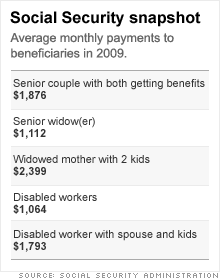No 2010 increase in Social Security
Seniors' benefits will not be adjusted for cost of living because of low consumer prices. Obama urges $250 emergency payments.

NEW YORK (CNNMoney.com) -- There will be no cost-of-living increase for 57 million Social Security beneficiaries next year because consumer prices have fallen, the Social Security Administration announced on Thursday.
It marks the first time that Social Security benefits have not been increased year over year since the cost-of-living adjustment was put into effect in 1975.
To help counterbalance the hit, President Obama is calling on Congress to send another $250 relief payment to seniors and other Americans to stem the economic strain.
"Even as we seek to bring about recovery, we must act on behalf of those hardest hit by this recession," Obama said in a statement Wednesday. "That is why I am announcing my support for an additional $250 in emergency recovery assistance to seniors, veterans, and people with disabilities to help them make it through these difficult times."
Last year, Social Security beneficiaries got a 5.8% cost-of-living adjustment, the largest since 1982, largely because of the spike in energy prices.
"This year, in light of the human need, we need to support President Obama's call for us to make another $250 recovery payment for 57 million Americans," said Commissioner of Social Security Michael J. Astrue in a written statement.
Since there will be no COLA for benefits, the law also prohibits the Social Security Administration from increasing the maximum amount of earnings subject to the Social Security tax. This year and next, the first $106,800 of a worker's earnings is subject to the 12.4% Social Security tax. Workers typically pay half of that and their employers pay the other half.
It's still not clear yet what if any changes will be made to seniors' Medicare Part B premiums for hospital care next year. The Social Security Administration said in its announcement that if there is an increase that a "hold harmless" provision in the law would protect 93% of Social Security beneficiaries from the increase.
Obama's proposed $250 payment is roughly equal to a 2% increase in benefits for the average Social Security beneficiary.
Congress approved a similar payment as part of the $787 billion economic recovery act enacted in February.
As with the first $250 recovery payment, the second one would be exempt from income tax, a senior administration official said in a call with reporters on Wednesday.
If approved by Congress, the payments would be sent out in 2010, most likely in the first half. "It wouldn't be late in 2010," the administration official said.
The measure would cost $13 billion over 10 years, according to White House estimates.
The call for increased benefits for seniors is one of several proposals to expand stimulus benefits. Lawmakers are also considering extending unemployment benefits and the homebuyer tax credit, both of which were included in the economic stimulus bill passed in February.
In addition to the $250 emergency payments, the White House has also publicly supported the extension of jobless benefits as well as the extension of subsidies to help the unemployed purchase health insurance under Cobra. The president has not said yet whether he supports the expansion of the homebuyer tax credit.
The original $250 relief payment was paid out of general revenue. That would likely be the case for the second payment as well.
Obama specified that he "is committed to ensuring that the $13 billion cost of the proposal does not reduce the solvency of Social Security or other social insurance programs."
That means the $13 billion wouldn't be deducted -- on the balance sheet anyway -- from the payroll taxes collected to pay for Social Security.
But it also won't be paid for by reducing spending or raising revenue in other parts of the budget. Typically economic stimulus is exempt from rules requiring that new measures be paid for.
So if the proposal passes, it will add to the country's annual deficit, which in 2009 was estimated by the Congressional Budget Office to have hit a record high of $1.4 trillion. ![]()



